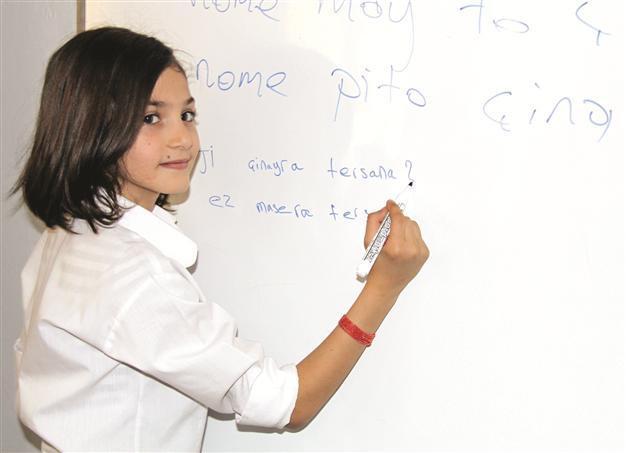‘Roj baş!’ Kurdish books set for class
ANKARA - Hürriyet Daily News

Kurdish elective courses is started to be thought in highschools in Diyarbakır. The course’s textbook includes alphabet, song lyrics and poems in Kurdish. AA photo
Turkey’s Education Ministry has announced the completion of a textbook for Kurdish elective classes that entered the school curriculum for the first time this year as part of the “Living Languages and Dialects” section.
The book for fifth-grade Kurdish classes will be different for the two main dialects of the language, Kurmanji and Zazaki, the ministry said, adding that it would publish the information on its website on Oct. 13. The books on the list will then be distributed to schools after they have been printed.
The cover of the teacher’s guide for the Kurdish classes bears the lyrics of a Kurdish song that says: “Ornate and beautiful/Pleasing and cute is the Kurdish language/A beautiful sound/Coy and gentle is the Kurdish language.”
The book consists of nine chapters. The first chapter is devoted to the alphabet, teaching letters and their pronunciation, as well as the difference between similar phonemes.
As part of the chapter, the book quotes a Hasan Emin poem, titled “March of the Letters,”
a Kurdish poem. The chapter also covers numbers. The second chapter is “Me and My Family,” which teaches students to introduce members of their family and friends while also teaching the parts of the day.
Nevruz through a conversation exerciseThe third chapter is titled “My School and Environment,” which covers school, classes, school items, school activities, as well as cities, villages, rooms of the house and colors.
The fourth chapter focuses on “Body and Health,” teaching about the body and its organs, personal hygiene, protection from germs and first aid. “Seasons and Calendars” forms the fifth chapter, teaching the seasons, months, days of the week and hours. The chapter briefly talks about Nevruz, the most important holiday of the year for Kurds, through a conversation exercise.
The sixth chapter is about “Food and Beverages,” which teaches the main verbs and conjugations, as well as subject pronouns. Students are also introduced to regional foods and beverages in the chapter.
The seventh chapter is titled “Games and Fairytales” and provides information about hide-and-seek, hopscotch, rolling marble beads, as well as nursery rhymes, jokes and tongue twisters. This chapter relocates Aesop’s tale “The Boy Who Cried Wolf” to northern Iraq and teaches “The Ant and the Grasshopper” by converting it into a poem.
“Pastime Activities” form the eighth chapter while the ninth and final chapter, titled “Traffic and Travel,” teaches about traffic rules, public transportation and tourist areas in Turkey.
The book also includes a Kurdish-Turkish glossary and complements teaching with speaking and writing exercises that focus on helping children increase their communicative skills in Kurdish dialects.
Meanwhile, the Education Ministry has added electives on the Quran and the Life of the Prophet Muhammad to the curricula of private schools that give education in foreign languages, like private French schools, private German schools, the American Robert College, Üsküdar American High School, İzmir American College and Tarsus American College.
In response to an offer from the General Directorate of Private Education Institutions, the new regulation will cover grades up to nine. The private Sankt Georg Austrian High School and the School of Commerce will also begin offering the two classes for two credits a week to 10th and 11th graders. In private Italian schools, the addition also includes Basic Religious Knowledge classes.
